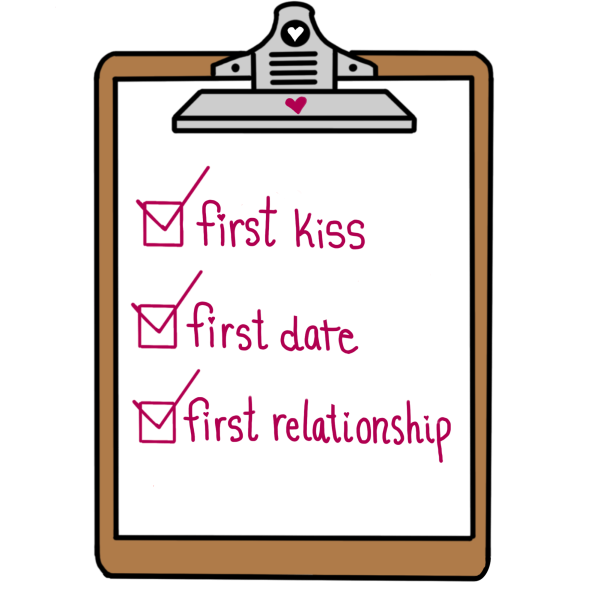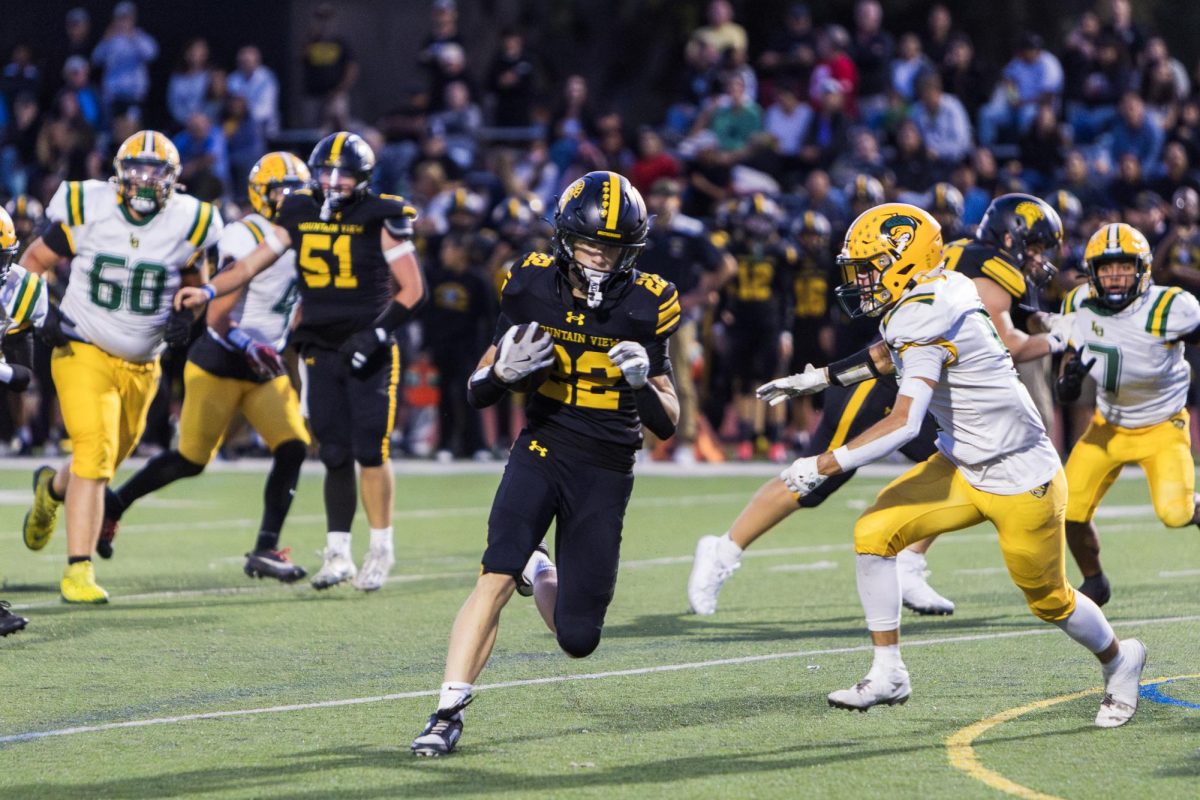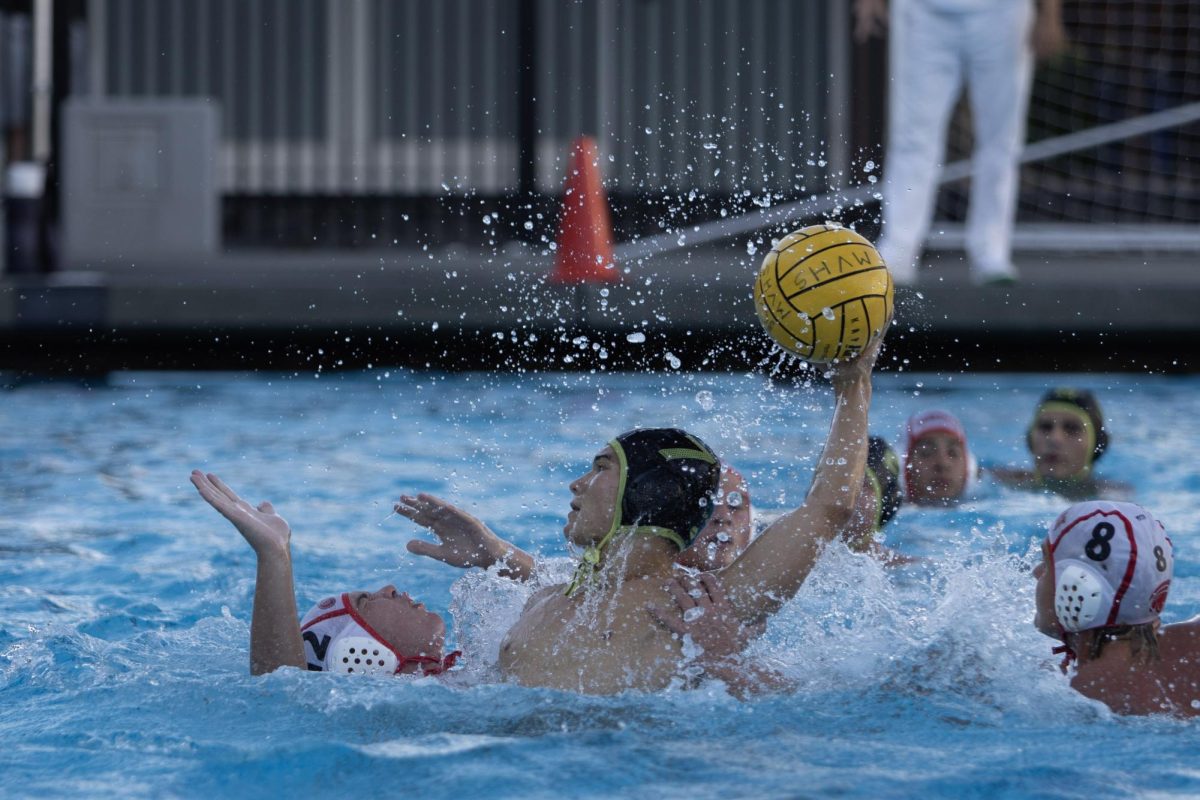
This article was originally published in a print edition of the Oracle in October 2023.
* Indicates that a source’s name has been changed in order to maintain their anonymity due to the sensitive nature of the subject.
Have you lost your virginity yet? Have you held hands with someone romantically? At what age did you get your first boyfriend or girlfriend? It’s common to hear these questions thrown around casually in peer groups or on social media, sophomore Orly Galatin said.
“It’s been almost indoctrinated into our brains that we should be in relationships,” Galatin said.
Questions about “how far” others have gone romantically can indicate a greater culture of peer influence, and create indirect pressure to date or to hit other romantic milestones.
“[This culture] makes people feel like they’re worthless as an individual and need to be in a relationship with someone else to be important,” junior Roshni Jobanputra said.
Jeni Woodfin, a Licensed Marriage and Family Therapist, said that such influences can take a toll on an individual’s self-esteem and mental health if they feel they are falling behind their peers romantically.
“If you’re one of the ones [who doesn’t] get your first kiss at 13, then you feel like ‘what’s wrong with me?’” Woodfin said.
During adolescence, when an individual’s brain isn’t fully matured, the impact of societal pressures and media consumption cannot be understated, said Nina Gonzaga, a Licensed Marriage and Family Therapist.
Media can also have significant impacts on teenage perception of relationships. Best-selling romance novels like those written by Colleen Hoover, a popular youth-adult novelist, or TV shows such as the popular series Euphoria idealize being in relationships, whether these relationships are healthy or unhealthy. A lot of media in this form can glorify unhealthy behaviors, such as obsessive communication, possessive behaviors, and forceful sexual activity, painting it as something to be desired or to be proud of.
This can contribute to an unhealthy perception of romance, senior Natalie Emerson said, potentially leading teenagers to get into relationships solely for the label. This can lead to individuals disregarding potential issues like toxicity, which can negatively influence future romantic behaviors and relationships by causing issues with commitment and problems with trust.
Cultural and Societal Influences
During adolescence, constant discussion of hitting romantic milestones can fuel an environment of competition between teenagers, Woodfin said. Intimate relationships can also be a source of validation for those who are insecure about their image or themselves, she said.
“If you’re not being kissed, or you’re not being chased, or not being chosen, then [you] can get pretty depressed,” Woodfin said. “[Teenagers] do all kinds of stuff to make themselves desirable.”
Gonzaga said that more than anything else, adolescents want to fit in and feel a sense of belonging, which can create pressure to hit romantic milestones.
“If you want a relationship or feel the pressure to be in a relationship, you’ll do anything,” Jobanputra said.
As people see their friends and peers getting into relationships, the pressure to “fit in with the rest” and date increases, junior Nate Kelly said.
“If you see people holding hands or [having] public displays of affection in the hallway, you might feel like ‘Oh, I need to catch up,’” Kelly said.
35% of adolescents ages 13-17 have been in a romantic relationship of some kind, according to the Pew Research Center.
Dr. Catherine MacGivillray, an associate Marriage and Family Therapist and professor of Gender Studies, said there is a difference in characterization between boys and girls in how they are portrayed in relation to their experiences with sex.
“For a boy, there are no limits,” MacGivillray said. “For girls, the number doesn’t even have to get into the double digits for her to be considered a slut or skank.”
MVHS Health teacher Tami Kittle said that boys especially can feel pressured to have sexual experiences due to the desire of having a high “body count” — the amount of sexual partners one has had.

Fellow teenagers tend to be overly interested in the romantic lives of the people around them, Galatin said, which she said has made her uncomfortable.
“I’ve been asked ‘have you had your first kiss?’ ‘What’s the most you’ve done with people?’ ‘What’s your rice purity score?’” Galatin said.
Teens feel inclined to answer, or feel coerced into telling people what they want to hear, Galatin said.
Kittle said that especially around adolescence, teens can act on impulsive romantic behaviors, and engage in sexual experiences which they may not be ready for.
“[Teens’] impulse control isn’t developed,” Kittle said. “All they want to do is what feels good right now, but they don’t think about the consequences.”
She said that as a consequence of impulsive decision making, teens may have sex at a younger age, and even regret their decision. MacGivillray said that because high schoolers are spending increasingly more time with their peers, which can potentially heighten social influences, because they are more aware of how others perceive them.
“You’re developmentally in a period where you’re trying to figure out your own identity,” MacGivillray said. “Part of the way that you do that is by seeing yourself reflected in the eyes of others, and in particular, your peers.”
Junior Anthony* said that he feels there’s shame associated with not having one’s first kiss at around 16, although he personally feels like the age is still a little young.
“I want to find the right person and be in a relationship,” Anthony said. “I don’t want to be at a party and kiss some random girl.”
Emerson said that this cycle of indirect peer pressure builds up, and can increase insecurities about not being in a relationship, or the desire to get in one. Seeing relationships depicted in fictional media is one thing, but seeing teenage relationships in reality is another, she said.
“We’re all very impressionable, even if we don’t think so,” Emerson said.
She said that if a friend hits a milestone like getting their first boyfriend or having their first kiss, it can be seen as a “token” — a prize that they have — which can make someone feel like they’re missing out. The image of American high school portrayed is very rigid and traditional, with football games, parties, and relationships, Emerson said.
“It can cause people to feel like if they don’t participate in these things that are so ‘fun and memorable,’ then they’re not going to have any memories,” she said.
Kittle said that leading up to high school dances such as prom and homecoming, the pressure to find a date or to get into a relationship can be exacerbated in numerous ways.
“Guys will ask the girl as a group so she can’t say no,” Kittle said.
Kelly said that in his social circle, and with people he knows, there was pressure to get a date for Homecoming on Oct. 11.
Even with the influence of these cultural and societal factors, multiple sources agreed that getting into a relationship and hitting intimate milestones should come at a different pace for everyone, and there isn’t a “right” time to do so.
“People are just at different places with what they’re ready to do,” Galatin said. “There’s nothing wrong [with that].”
Unhealthy vs. Healthy Relationships

Gonzaga said a safe and healthy relationship is one in which both members feel open to share their honest thoughts, can set boundaries for each other, and are met with respect and kindness. The ability to address disagreements in a respectful way during conflict resolution is key to maintaining a healthy relationship, she said.
“Talk about things when you aren’t escalated in your emotions and [when] both people are fairly calm,” Woodfin said. “Set up the conversation for success, lead with an observation, and then go into your feelings.”
Setting, communicating, and maintaining boundaries are an essential part of a successful relationship, Gonzaga said, and when adolescents exhibit unsafe behaviors or patterns that violate these boundaries, it is often a sign that their relationship is delving into unhealthy territory.
“Red flags of [unhealthy relationships] tend to be centered around possessiveness or some level of power or control over one another,” Gonzaga said. “Lacking communication and boundaries, and not being able to have difficult conversations [can mean an unhealthy relationship].”
Adolescents in controlling relationships, specifically teenage girls, often struggle to determine what their true feelings for their partner are, a result of mixed signs and signals, Gonzaga said.
“It’s quite confusing for girls to figure out ‘does he really care about me or is he just controlling me?”’ MacGivillray said.
MacGivillray said that adolescents can often misread signs of control as their partner caring about them, and may interpret their partner’s inquiry of their whereabouts and who they are with as genuine concern rather than an attempt to assert dominance or maintain control.
Another clear sign of an unhealthy relationship involves pressure to become sexually active, MacGivillray said, which can manifest in the form of one member of the partnership forcing sex, which the other member may not be comfortable with.
Woodfin said that adolescents often fear loneliness, which can make it more difficult to leave a relationship even if it has become toxic or unsafe.
“[People often say] ‘It’s better to be with somebody, even if they are hurting me, because I am afraid that I won’t be okay by myself,’” Woodfin said.
According to research conducted by Mayo Clinic, signs of abusive and unhealthy relationships can also include name calling and insults, forced isolation and confinement, threats, and physical abuse.
When a teenager finds themself in such a situation, both Woodfin and Gonzaga encourage adolescents to share their struggles with a friend, an adult on campus, a therapist, a parent, or any other trusted source.
“Talking to a trusted adult can help personalize the situation for that teen and develop conversations about setting boundaries and feeling safe,” Gonzaga said.
Gonzaga said that after teenagers experience an unhealthy relationship, there may be a level of hurt that needs to be addressed and healed before the adolescent can move forward and get into another relationship.
She said that adolescents frequently experience some level of “relational rupture” after a breakup — feelings of pain regarding future relationships that result from the aftermath of being in an unhealthy relationship.
“You need to acknowledge the hurt caused from the unhealthy dynamics,” Gonzaga said. “You have to own the needs that weren’t met and the relationship that was unhealthy, and then you can set the tone and begin relational repair.”
Influence of Media
To All The Boys I’ve Loved Before. The Summer I Turned Pretty. Better Than The Movies. 10 Things I Hate About You. All of these popular rom-coms are geared toward high schoolers, with relationships as their main plot-focus.
Woodfin said that the entire “rom-com” movie genre is usually centered around women finding men to get into relationships with, which can reinforce already-existing pressures for teens to find partners. The women who are portrayed as the love interests often fit a stereotypical western standard of beauty, and there is little representation for women who are not white, thin, and conventionally attractive, she said.
“In the movies you see the pretty [women] get chosen, and the ugly ones don’t,” Woodfin said.
Jobanputra said that media portrayal of women in these rom-coms and in other movies and TV shows devalues them if they aren’t in a relationship with a man.
“When women aren’t in a relationship, [the media] portrays them as more undesirable or that there’s something wrong with them because they’re not in a relationship,” Jobanputra said.
Emerson said that a big theme in the media is advertising relationships, regardless of whether or not they are healthy. She said that shows and books can romanticize unhealthy and abusive relationships, teaching impressionable teenagers that “this is how it is.”
A study done by the University of Maryland said that viewing of romantic television programming was “positively associated with idealistic expectations of marriage.”
Kelly said that the various high school dramas popular among teenagers can influence them to try and replicate what they’re seeing on the big screen, even if it’s not necessarily realistic.
Relationships in coming-of-age movies usually have a happy ending, which doesn’t encompass the full complexity of those in real-life relationships.
“It’s very unreasonable compared to reality,” MacGivillary said. “If it’s realist fiction, as opposed to fantasy, then we do as humans tend to identify with that, relate to that, and be influenced by that.”

A lot of romance novels tend to follow the same script, MacGivillray said, with “enemies to lovers” being a common theme – a combative relationship which turns to love over time.
In addition, MacGivillary said that most representations of high school students in fictionalized media portray teenagers as sexually active.
Teenagers today have been living with the internet for their entire lives, Woodfin said, and the rise of digital pornography and social media have had significant influence on the way that they may think about sex.
According to a report done by the National Institutes of Health in Jan. 2023, 42% of adolescents aged 10-17 reported viewing pornography online. Additionally, a study found that in a group of 1000 adolescents, almost double the amount of males compared to females had watched online pornography, the report said.
Woodfin said that in her experience as a therapist, because some teenagers have been exposed to porn and other sexual material early on, she has seen a larger proportion of younger kids reporting that they want to engage in sexual experiences. She said that because of its easy access and widespread reach, porn can influence relationship expectations as well.
“Sometimes people who are in relationships imagine that sex looks like porn sex,” Woodfin said. “People don’t feel like they can say no because porn is setting the expectation.”
MacGivillray said that the representation of sex in the media presents its most idealized and unrealistic form, in turn, warping impressionable teenager’s views of sex.
“You can start to feel like ‘is there something wrong with me? Is there something wrong with my body?’” MacGivillray said. “Because boys look at porn more often than girls do, oftentimes girls are being invited to engage in activities that they have no idea comes from porn.”
Increased access to sexual content can lead to adolescents engaging in sexual activity earlier, even if they’re not necessarily ready, Woodfin said.
“Kids mature a lot earlier and have access to information that previous generations didn’t have,” Kelly said.
Along with the increased accessibility of sexual content via the internet, social media has a significant influence on one’s perception of relationships, as well as their self-confidence.
“Social media definitely filters what we see and the majority of people only show the good parts of their lives,” Emerson said. “It can create a very idealized image of relationships and life.”
MacGivillray said that because adolescents have access to a wider range of sources on relationships on the internet, both accurate and inaccurate, it can increase insecurities for those who haven’t hit romantic milestones.
“If you’re feeling insecure, rather than soothing your insecurities, [social media] can exacerbate them,” MacGivillray said. “You’re seeing all these perfect people, and their perfect lives.”
Galatin said that seeing others post about their romantic partners can contribute to feelings of jealousy and loneliness, creating a sense that one is missing out on something.
A study done by Stylist reported that over 40% of women feel that seeing relationships portrayed on social media can make them less happy with their own.
Gonzaga said that social media algorithms on Instagram, TikTok, and Twitter feed people information about relationships that can lead to the internalization of ideas about what they should look like. This can contribute to the normalization of certain romantic behaviors portrayed on the screen, that aren’t necessarily true in real life.
“A skill set that current adolescents have to deal with that previous adolescents didn’t have to deal with as much is some discernment about what information to actually take in, and what information to actually internalize and apply to their lives,” Gonzaga said.



































